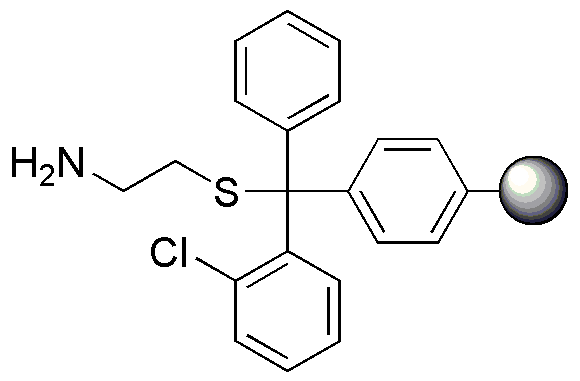Cysteamine 2-chlorotrityl resin is widely utilized in research focused on:
- Peptide Synthesis: This resin serves as a solid support for the synthesis of peptides, allowing for efficient coupling and deprotection steps in solid-phase peptide synthesis (SPPS).
- Drug Development: It is employed in the development of pharmaceuticals, particularly in creating drug candidates that require specific amino acid sequences for therapeutic efficacy.
- Bioconjugation: The resin is used to attach biomolecules, such as antibodies or enzymes, to surfaces or other molecules, enhancing the functionality of bioconjugates in diagnostics and therapeutics.
- Research in Neuroscience: Cysteamine derivatives can be studied for their neuroprotective properties, making this resin valuable in the exploration of treatments for neurodegenerative diseases.
- Custom Resin Development: Researchers can modify the resin to create tailored supports for specific applications, allowing for greater flexibility and innovation in chemical synthesis.
General Information
Properties
Safety and Regulations
Applications
Cysteamine 2-chlorotrityl resin is widely utilized in research focused on:
- Peptide Synthesis: This resin serves as a solid support for the synthesis of peptides, allowing for efficient coupling and deprotection steps in solid-phase peptide synthesis (SPPS).
- Drug Development: It is employed in the development of pharmaceuticals, particularly in creating drug candidates that require specific amino acid sequences for therapeutic efficacy.
- Bioconjugation: The resin is used to attach biomolecules, such as antibodies or enzymes, to surfaces or other molecules, enhancing the functionality of bioconjugates in diagnostics and therapeutics.
- Research in Neuroscience: Cysteamine derivatives can be studied for their neuroprotective properties, making this resin valuable in the exploration of treatments for neurodegenerative diseases.
- Custom Resin Development: Researchers can modify the resin to create tailored supports for specific applications, allowing for greater flexibility and innovation in chemical synthesis.
Documents
Safety Data Sheets (SDS)
The SDS provides comprehensive safety information on handling, storage, and disposal of the product.
Product Specification (PS)
The PS provides a comprehensive breakdown of the product’s properties, including chemical composition, physical state, purity, and storage requirements. It also details acceptable quality ranges and the product's intended applications.
Certificates of Analysis (COA)
Search for Certificates of Analysis (COA) by entering the products Lot Number. Lot and Batch Numbers can be found on a product’s label following the words ‘Lot’ or ‘Batch’.
Numéro de catalogue
Numéro de lot/série
Certificates Of Origin (COO)
This COO confirms the country where the product was manufactured, and also details the materials and components used in it and whether it is derived from natural, synthetic, or other specific sources. This certificate may be required for customs, trade, and regulatory compliance.
Numéro de catalogue
Numéro de lot/série
Safety Data Sheets (SDS)
The SDS provides comprehensive safety information on handling, storage, and disposal of the product.
DownloadProduct Specification (PS)
The PS provides a comprehensive breakdown of the product’s properties, including chemical composition, physical state, purity, and storage requirements. It also details acceptable quality ranges and the product's intended applications.
DownloadCertificates of Analysis (COA)
Search for Certificates of Analysis (COA) by entering the products Lot Number. Lot and Batch Numbers can be found on a product’s label following the words ‘Lot’ or ‘Batch’.
Numéro de catalogue
Numéro de lot/série
Certificates Of Origin (COO)
This COO confirms the country where the product was manufactured, and also details the materials and components used in it and whether it is derived from natural, synthetic, or other specific sources. This certificate may be required for customs, trade, and regulatory compliance.


